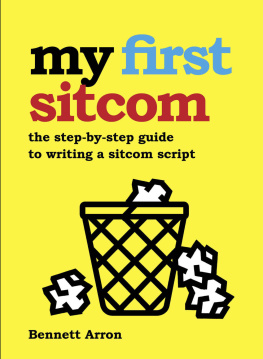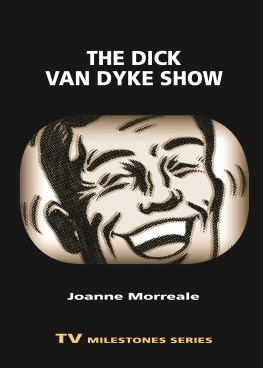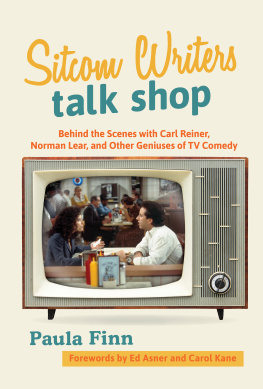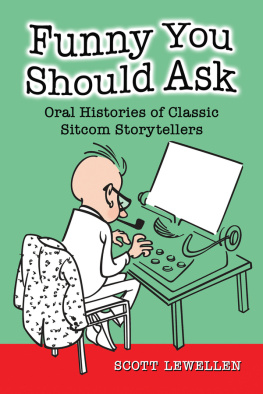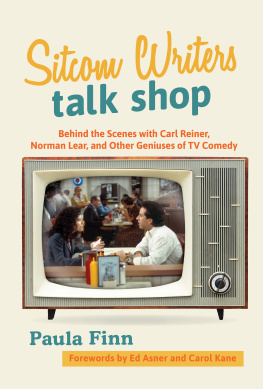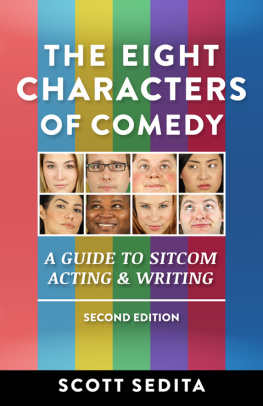Arron - My First Sitcom
Here you can read online Arron - My First Sitcom full text of the book (entire story) in english for free. Download pdf and epub, get meaning, cover and reviews about this ebook. year: 2022, publisher: Silly Papi Ltd, genre: Detective and thriller. Description of the work, (preface) as well as reviews are available. Best literature library LitArk.com created for fans of good reading and offers a wide selection of genres:
Romance novel
Science fiction
Adventure
Detective
Science
History
Home and family
Prose
Art
Politics
Computer
Non-fiction
Religion
Business
Children
Humor
Choose a favorite category and find really read worthwhile books. Enjoy immersion in the world of imagination, feel the emotions of the characters or learn something new for yourself, make an fascinating discovery.
- Book:My First Sitcom
- Author:
- Publisher:Silly Papi Ltd
- Genre:
- Year:2022
- Rating:4 / 5
- Favourites:Add to favourites
- Your mark:
- 80
- 1
- 2
- 3
- 4
- 5
My First Sitcom: summary, description and annotation
We offer to read an annotation, description, summary or preface (depends on what the author of the book "My First Sitcom" wrote himself). If you haven't found the necessary information about the book — write in the comments, we will try to find it.
My First Sitcom — read online for free the complete book (whole text) full work
Below is the text of the book, divided by pages. System saving the place of the last page read, allows you to conveniently read the book "My First Sitcom" online for free, without having to search again every time where you left off. Put a bookmark, and you can go to the page where you finished reading at any time.
Font size:
Interval:
Bookmark:
My First Sitcom
Copyright 2022 Bennett Arron
All rights reserved.
This book or any portion thereof may not be reproduced or used in any manner without the express written permission of the publisher except for the use of brief quotations in a book review.
Published by Silly Papi Ltd
Summit House, 170 Finchley Road, London NW3 6BP UK
ISBN 978-0-9933571-2-1
WHY?
Whats the point? Seriously, why bother? Its very, very unlikely that your sitcom script will ever be produced. There is more chance of winning the lottery. So why write it?
Its because you HAVE to. Its a compulsion. Writers have to write in the same way as some other people have to do the things they have to do (I cant think of any examples.)
If a day goes past in which I havent written something be it working on my own scripts, script-editing someone elses, or writing some stand-up material then I consider that a wasted day and I genuinely feel down about it. Its actually one of the reasons I had for writing this book. Yes, I wanted to share the knowledge and experiences I have picked up over the past 30 years as a writer, but I also just needed to write it. Oh, and make some money. After all, Im a writer were never sure when the next bit of work will come in.
They say you cant teach someone to be funny. Well, if you dont actually have a sense of humour at all then perhaps this isnt the book for you and youd probably be better off working as a comedy commissioner (yes, I went there). The thing is, Ive never met anyone who doesnt have at least some sense of humour, some understanding of what is/isnt funny and how to make someone laugh to some extent. But can you teach someone to write? The short answer is yes. The long answer is yeeeeeeees.
Ive been running sitcom-writing workshops for more than eight years and Ive had people attend who have never written anything before, save for emails and Christmas cards. However, by the end of the workshop they have a good understanding of how to start writing and, more importantly, how to continue once theyve started.
The majority of us have the ability to hold a conversation, be it verbally or written. If someone sends you a humorous text message, you will attempt to respond in a humorous way no doubt with varying degrees of success. This is dialogue, albeit in its simplest form. So we can all write. We just need to hone and refine it.
So whether you are a complete novice when it comes to writing or if you have written scripts and have just lost your way a bit, this book will help.
As well as learning about character development, plot structure, dialogue, etc., it will also show you how to prepare your script and accompanying documents for sending out to producers.
Okay, youre still reading, so youre clearly dedicated and youre halfway there. (Youre not, but Im trying to be encouraging.)
Lets get started.
CHAPTER
ONE
STARTING POINT
CHAPTER
TWO
MOVING ON
Its awful, isnt it? The blank page. The writers nemesis. How many times have you tried to start a script, stared at a blank page, and then gone to check the contents of your fridge or see what people are doing on social media? (Spoiler alert theyre doing nothing of any interest.)
When I first started writing I didnt have a computer or laptop. I know, can you imagine! I did have my dads old typewriter, but the letter L didnt work, so it was really useless or, as I would have typed it then, reay useess. So I mainly wrote by hand. I still do that very often and I have a pile of notebooks, all with superhero covers (although I have to point out thats not essential). The advantage of working with pen and paper is that you can doodle in the corner, which is much trickier on a laptop as I found out the hard way.
People often ask me where I get my inspiration, or where ideas come from. Which is a similar question really. The thing is, you never know when an idea will hit, so when it does you need to note it down. Of course nowadays you can simply write notes on your phone. But for me putting them in a small notebook is quicker, and easier to find again later. Either way, whenever you do make notes, just make sure they make sense. I have odd notes saying things like: The train lunch and Cat dancing, and I have no idea what I was thinking at the time.
Of course, writing as much as you can when you first have an idea is essential. Apart from anything else, it will show you whether or not an idea has legs. Unlike a one-off, e.g. a film script or a radio play whereby you dont have to worry about future episodes, a sitcom needs to have the potential to run for more than one series.
So, where to begin? How shall we fill this blank page?
Well, the first thing I want you to do is to have a think about the sitcoms you like. Write down your top five.
Do it!!
Now have a look at your list. Do these programmes have anything in common? What do you like about them apart from the fact they have made you laugh?
Is the situation itself fun, funny or interesting? Are the characters easily identifiable? Are they friendly? Are they people with whom youd like to hang out? Are they pathetic? Are they concerned about status? Are they fools? Are they incompetent? Are they oblivious to how others feel about them? Do they have several of these qualities?
How would these sitcoms have been pitched to producers and broadcasters? Is there a unique selling point? If not, what made it stand out?
Remember, some sitcoms do well because they are the right thing at the right time the zeitgeist element. Had they been pitched a year earlier or later, they might not have had the same success.
Now think about the sitcoms you dont like which is always more fun.
Write down your least favourite three.
Why dont you like them? Again, think about the situation, the characters, the dialogue. Why doesnt it work for you?
We all have sitcoms we dont like. No, I wont list mine here. But remember, even if you dont like them, and perhaps critics dont like them, hundreds of thousands of people will. So work out what the appeal is. Remember, you cant please all of the people all of the time, but you can still make an incredibly successful sitcom
But how do you start?
Well, one way not to start is just by writing aimlessly. I edit many scripts and I can always tell when someone has just started writing without any kind of structure. Just pages and pages of dialogue, some of which may be funny, but which ultimately goes nowhere with no real plot and no real character development. So plan your script. It may sound dull and tedious, but, like building a house, unless there is a solid foundation, the whole thing will eventually fall apart.
I will assume that you dont have an idea for a sitcom script at the moment (I know you probably do, but just go with me) and so you are starting completely from scratch. We will look at four things in order:
- SITUATION
- CHARACTERS
- PLOTS
- DIALOGUE
You could, in theory, swap the first two around; for example, the characters in Friends are more important than the situation (the situation being six friends living in New York). But for me the situation is what makes the character. For example: M*A*S*H, Porridge, Red Dwarf, Only Fools and Horses, etc. force the characters to be what they are. But thats the order in which we are going to deal with these. If you dont like it, then feel free to read them in a different order.
And dialogue comes last, as its impossible to write it until you know the characters.
Saying that, I am going to go against what I have just said, and set you your first writing task. And dont think, Oh I wont bother, Ill just skip this bit. Theres no point.
Write a short scene. This scene should be between one and three pages long and have two to four characters. The scene can be about anything at all, but it must finish with the line: And thats why it was a bad idea!
Next pageFont size:
Interval:
Bookmark:
Similar books «My First Sitcom»
Look at similar books to My First Sitcom. We have selected literature similar in name and meaning in the hope of providing readers with more options to find new, interesting, not yet read works.
Discussion, reviews of the book My First Sitcom and just readers' own opinions. Leave your comments, write what you think about the work, its meaning or the main characters. Specify what exactly you liked and what you didn't like, and why you think so.

